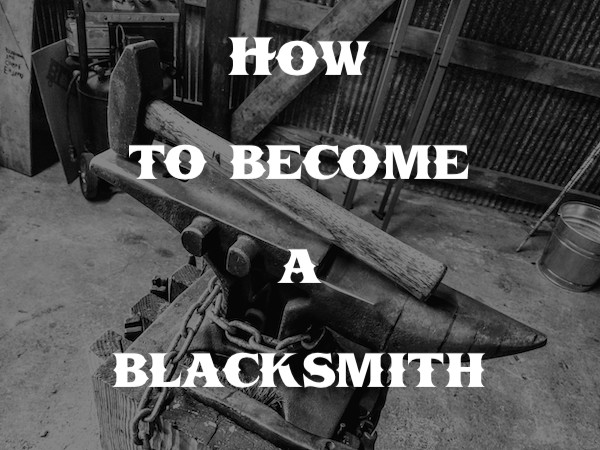Have you ever wondered about how to become a blacksmith?
In this post, we’ll talk about what it was like “back then” and compare it to what it’s like now.
How to Become a Blacksmith “Back Then”
If we were living 150 years ago, you could become a blacksmith’s apprentice before turning 10 years-old.
The blacksmith would likely be just down the street in your small town so you would know him or your parents would.
Your job as an apprentice would involve these daily tasks:
- Keeping the shop organized and clean.
- Starting the forge fire and operating the bellows.
- Fetching water.
- Shoveling coal.
- Learning the trade through simple, repetitive projects like making nails.
Your decision to become a blacksmith wouldn’t necessarily have been yours to make and you wouldn’t necessarily love it.
But you would be in it for the long haul as most trades relied on the apprenticeship to journeyman to master path.
How to Become a Blacksmith Now
The process for becoming a blacksmith is quite a bit different in the 21st Century.
The demand for blacksmiths is drastically lower due to our advancements in machine technology.
What was once made by a blacksmith can more quickly and more precisely be made by a machine.
The one exception: Shoeing horses still requires a human blacksmith. There are no robot farriers. For this reason, becoming a farrier is one of your best bets for a steady income as a blacksmith.
Farrier Work
To become a farrier or horseshoer, it’s recommended that you do formal training.
There are multiple farrier schools across the country that specialize in getting people up to speed with horseshoeing.
Here’s a good resource for Farrier Schools:
Let’s look at one school to get an idea of time commitment and cost.
The Arkansas Horseshoeing School offers:
- 8-Week Course: $6,900
- 12-Week Course: $7,900
- 16-Week Course: $8,900
- 24-Week Course: $15,900
Comparing costs for a college degree from the University of Arkansas, you’re looking at $35,280 (in-state) $92,672 (out of state).
The benefits of going to horseshoeing school are spending a lot less money and walking away with the training you need to start earning money after a few weeks versus a few years.
Maybe you’re not interested in doing farrier work, though.
If you’re looking at traditional blacksmithing, knife making, etc. we’ll talk about those next.
Traditional Blacksmith Work
Becoming a successful, professional blacksmith in the traditional sense is much harder than farrier work.
Since these skills aren’t in demand, you need to spend a lot of time networking, marketing, and finding a specialty within blacksmithing to focus on.
To get a broad base of blacksmithing skills, there are classes and blacksmith schools in almost every U.S. state.
The Blacksmith School Map is a good resource for finding what classes are available near you.
Personal Story:
I learned how to forge at a school in western North Carolina called The John C. Campbell Folk School.
I was fortunate to be accepted into one of their 9-week Work/Study programs that allowed me to:
- Enroll in three weeks of blacksmithing classes at no charge.
- Live on their campus for free.
In exchange, I worked with other work/study students to keep the grounds and garden in good shape and welcome regular students each week.
My only expenses while I was there involved class materials costs. Thankfully, steel is relatively cheap and they have a large scrap bin that can be used for experimenting.
I was taught by extremely talented professional blacksmiths in each of my three classes and came away with a great foundation to get started on my own.
How to Become a Blacksmith in 3 Steps
- Find a school or classes near you that teach the skills you want to learn.
- If you can’t afford the tuition, they often offer financial assistance.
- Absorb as much information as you can while you’re there. Ask questions. Most blacksmiths are happy to share their knowledge.
After taking the time to learn from people with experience, you’ll be in a better position to get started.
At that point, you might begin your research into where to buy forges, anvils, hammers, and tongs.
If you’re already there, you might find these articles helpful:
I’m Here to Help!
If you have any questions, please feel free to send me an email.
